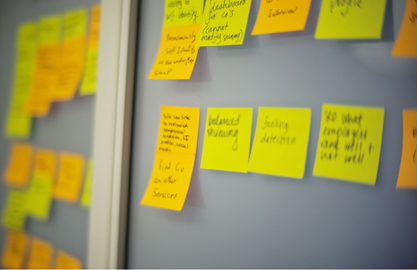To learn more, register for this series of webinars on experience capitalization in French. Registration is open now!
How many times have you been told “we don’t need to reinvent the wheel”? How many times have you been asked to take stock of what has been done in your organization? Do you want to know how to learn from the past, how to share and transfer knowledge? If so, this webinar series is for you!
In order to strengthen the capacity of organizations in knowledge management, the YenKasa Africa regional initiative, FAO and IFAD with its OPenACP Programme -FO4ACP are offering a series of webinars that review the online course on Experience Capitalization for Continuous Learning, available free of charge on the FAO Digital Academy.
The blended learning programme (webinars and online course) on experienced capitalization will run from 28 March to end of June 2023.
This programme is intended for farmers’, fishermen’s and foresters’ organizations in particular. It is open to anyone interested in capitalization, knowledge management or the implementation of good practices.
The learning programme includes six webinars. The online course consists of five units with a workload of one to three hours per unit. The webinars and the online course are freely available to anyone interested in the subject.
The online course is now available at the following link in French and English
Join the Discussion group (Dgroup) and keep up to date with the latest ideas and innovations in experience sharing.
People interested in the course must register for each webinar! After registering, you will receive a confirmation email with information on how to participate in the webinar. The webinars will be held at 11:00 a.m. CEST, European Summer Time or UCT+1, Universal Time+1.
- 9.00 for Abidjan, Bangui, Bamako, Conakry, Dakar, Lomé, Rabat, Sao Tomé, Ouagadougou
- 10.00 for Algiers, Bangui, Brazzaville, Kinshasa, Malabo, Ndjamena, Niamey, Porto Novo, Tunis
- 11.00 for Brussels, Luxembourg, Paris, Rome
- 12.00 for Addis Ababa, Antananarivo, Asmara, Moroni, Nairobi
Tuesday, March 28 – Webinar 1: Introduction: What is experience capitalization, and why is it important?
The edited version of the webinar, without the questions and answers, has been posted on YenKasa Africa’s YouTube channel (duration 37:06).
The full version is available on YenKasa Africa Facebook page.
Tuesday 18 April – Webinar 2: Preparing the experience capitalization process
The edited version of the webinar has been posted on YenKasa Africa’s Youtube channel in 4 parts.
- Part 1- Main Presentation (Duration 27:16)
- Part 2-Example from FAO’s “Initiative Pêches Côtières (IPC)” (Duration 17:27)
- Part 3- Questions and Answers (Duration 34:20)
- Part 4- How to access the course on learning from experience on the FAO Digital Academy (Duration 11:49)
The full version is available on YenKasa Africa Facebook page.
Tuesday 2 May – Webinar 3: Implementing the process – collection, collation and analysis (+ facilitation tips)
The edited version of the webinar has been published on the Youtube channel of YenKasa Africa (Duration 40:00)
The full version is available on the YenKasa Africa Facebook group
Tuesday 23 May –Webinar 4: Implementing the process – documenting and sharing
The edited version of the webinar was published on YenKasa Africa’s Youtube channel in 2 parts.
Part 1: Implementing experience capitalisation: documenting and sharing (Duration: 43:13)
Part 2: Documenting and sharing. An example of feedback with radio listeners (Duration: 34:17)
The full version is available on the YenKasa Africa Facebook group
Tuesday 30 May – Webinar 5: Generating Change
The edited version of the webinar has been published on the Youtube channel of YenKasa Africa (Duration 47:07)
The full version is available on the YenKasa Africa Facebook group
Tuesday 27 June – Webinar 6: Conclusions, discussion, questions and answers
The edited version of the webinar was published on YenKasa Africa’s Youtube channel in 3 parts.
Part 1: Summary – Conclusions and recommendations (Duration: 1:05:37)
Part 2: Experiences of CTOP and Agricultural Producers on capitalisation: SOS fertilisers (Duration: 17:12)
Part 3: Innovating radio and mobile applications – Farm Radio International (Duration: 30:10)
The full version is available on the YenKasa Africa Facebook group
More info on the course and Experience Capitalization
What is experience capitalization?
Experience capitalization is a methodological process by which an experience is identified, analysed and documented, leading to the creation of knowledge (e.g. good practices or lessons learned), which can be shared and used to generate change.
What is the purpose of the course?
This course introduces the methodology and process of experience capitalization. It provides guidance and tools to help you plan and implement your own learning process and ensure its effectiveness and efficiency.
This course aims to provide organizations working in development programmes with the tools and skills to plan and implement a learning process and contribute to improving the effectiveness of their work.
Course objectives
The learning programme will provide an awareness of the conditions and requirements of such a process and an understanding of the steps to be taken. In particular, through the learning programme, learners will be able to:
- Identify or recognize the value of experience capitalization in their work
- Develop skills to use experience capitalization in their work
- Be able to use, and help others to use experience capitalization.
- Target audience of the course
The course is designed for professionals involved in reflecting, learning and sharing lessons from their work. It is therefore intended for team leaders, managers, technical staff of projects and programmes, monitoring and evaluation officers, communication professionals, knowledge management and sharing professionals.
Participants will learn
- How to facilitate and plan a learning process
- How to implement a learning process step by step
- How to adopt, adapt, extend and generalize experience Capitalisation.

